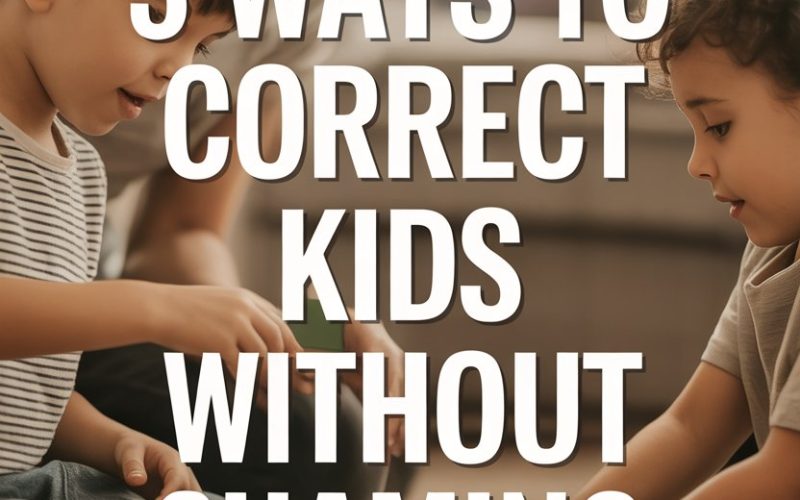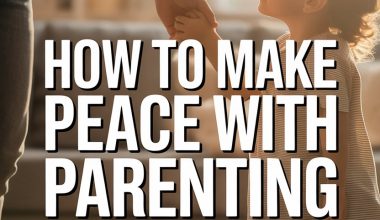Anyone who’s ever tried getting a toddler into pyjamas when they’d rather streak through the living room knows: correcting kids is an Olympic sport.
And sometimes, in the heat of the moment (either when the milk has hit the floor or the sibling’s hair is mysteriously shorter), it’s all too easy to blurt out things we regret.
But discipline doesn’t have to mean shame.
In fact, research shows that kids who feel respected and understood are actually more likely to cooperate—and less likely to grow into adults who need therapy to unpack their childhoods. Fancy that.
Ready for a few real-world, busy-parent-friendly approaches that can change the tone in your house by tea time?
1. Name the Behavior, Not the Child
Children are not their mistakes. Yes, even the ones who just used your lipstick as a highlighter.
When a child does something wrong, it’s tempting to say, “You’re so naughty,” or, “Why are you always so careless?”
But that’s a fast track to shame—and it doesn’t actually help them do better next time. Instead, focus on exactly what happened.
Try this: “I see you drew on the wall with markers. Markers are for paper.”
Notice the difference? There’s no label attached to your child—just a clear description of what went off track, and a reminder of the rule.
This tiny switch helps your child separate their actions from their sense of self. They’re not a bad kid; they made a choice that needs fixing.
Researchers at Child Mind Institute note that separating the behavior from the child’s identity improves self-esteem and leads to better behavior over time.
When children believe they’re capable of making better choices, they usually do.
A friendly tip for moments when you feel your inner volcano bubbling up: take a breath (or three). Speak to the specific action, not the whole child.
It’s easier to wipe off marker than repair a bruised ego.
2. Get Curious Before You Correct
Ever caught yourself launching into a lecture before your child’s even had a chance to explain? (No judgment. The urge to monologue is strong.)
But sometimes, behavior that looks like mischief is actually a plea for help or a sign of confusion. By asking gentle questions, you signal to your child that you’re on their side—even if you’re about to lay down the law.
Try this approach: “I noticed you didn’t feed the dog like we agreed. What happened?” This opens space for your child to talk about being distracted, confused, or maybe just unsure about the task.
You might find out they thought their sibling was on dog duty, or that the dog gave them the stink eye and they got nervous.
Clinical psychologist Dr. Laura Markham recommends curiosity as a tool for connection. When parents get curious, children feel safer and more willing to own up to their mistakes.
If your child’s answer is more, “I dunno,” than a TED Talk, that’s normal. Keep your tone light and your questions open. You’re aiming for dialogue, not a cross-examination.
And if you discover the real issue (maybe chores are overwhelming, maybe your child genuinely didn’t know the rule), correcting becomes much simpler. You can address the root cause, rather than just the symptoms.
3. Offer a Way to Make Amends
Children are surprisingly good at fixing their own mistakes—when given the chance.
Shame stops kids in their tracks. It says, “There’s no way out of this. You’re just bad.” But healthy correction invites them to clean up, fix, or apologise, and then move on.
It’s the difference between a life sentence and community service.
For example, if your child spills juice all over the sofa, instead of bellowing, “How could you?!”, try handing them a towel and saying, “Spills happen. Let’s clean it up together.”
Or, if a sibling spat has left tears in its wake, encourage apologies and help them brainstorm how to play more kindly.
The restorative approach, as educational experts at Edutopia champion, builds responsibility and resilience, not resentment.
Younger kids may need a little coaching at first. “What do you think we could do to fix this?” works wonders.
For older children, you might be surprised at how inventive and sincere their solutions can be. (And if their idea of ‘making amends’ is sharing a single grape with their brother—hey, it’s a start.)
The real magic? When kids see mistakes as things they can put right, shame doesn’t stand a chance. They learn that everyone slips up sometimes, but everyone gets to try again.
The Power of Repair
Parenting isn’t about perfection—if it were, the world’s biscuit supply would dry up from nervous snacking.
Mistakes, messes, misunderstandings: all part of the package.
Correcting children without shame isn’t about lowering standards or ignoring problems. It’s about building a relationship where your child trusts you enough to tell the truth, try again, and keep growing.
A home filled with repair—naming the behavior, getting curious, and making amends—becomes a place where kids (and parents) can breathe.
And, with luck, where marker stays on paper and the dog always gets dinner.
Tea, anyone?




